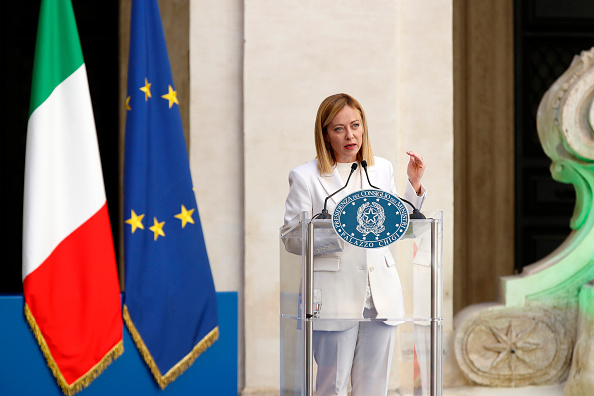Italian Prime Minister Giorgia Meloni has called for restraint and diplomacy in the growing trade standoff between the European Union and the United States, urging Brussels not to meet American tariffs with retaliatory measures but instead to pursue their removal through direct negotiations.
In a televised interview with TG1 on Thursday night, Meloni expressed skepticism toward the EU’s current trajectory, warning that matching tariffs with tariffs could end up harming Europe more than the U.S.
“I am not convinced that the best choice is to respond to duties with other duties,” the Italian premier told viewers. “The impact could be greater on our economy than what happens outside our borders. We need to open a frank discussion with the Americans, with the goal, from my point of view, of removing duties, not multiplying them.”
Her remarks come amid mounting tension between Washington and Brussels after U.S. President Donald Trump announced new tariffs on European steel and aluminum on March 12, reigniting trade friction that had eased in recent years. On Wednesday, the U.S. president followed these measures with a 20 percent flat tariff on imports from the European Union and a 25 percent tariff on imported cars — a move expected to significantly affect key European economies like Italy and Germany, both of which have sizeable automotive manufacturing industries.
According to EU sources, the bloc is now finalizing its response, with the first round of countermeasures expected to be approved in a vote on April 9 and implemented as early as April 15. A second wave of tariffs is likely to follow on May 15.
EU officials say the planned retaliation reflects input from national governments and is in line with trade defense protocols. However, Meloni signaled that Italy may advocate for an alternative path.
Asked whether Italy’s position aligns with that of the European Commission, Meloni replied that Rome would put Italian interests first. “Italy’s role is to bring Italian interests to Europe, especially now. While we negotiate with the Americans, there’s also much we can do internally — including removing tariffs we’ve imposed on ourselves.”
She criticized what she called “ideological rules” within the EU’s Green Deal — pointing specifically to the automotive sector — which effectively act as non-tariff barriers to trade and hinder Europe’s competitiveness.
“The auto industry is already suffering from tariffs,” she said. “Then there’s energy — a major factor in our competitiveness — where we must show more courage. And let’s not forget simplification: we’re drowning in bureaucracy. Lastly, the Stability Pact. Perhaps it’s time to consider a revision.”
Meloni’s stance appears to diverge from the EU consensus as Brussels, backed by Paris and Berlin, gears up for a firm response to the Trump administration’s protectionist policies. The White House, for its part, has doubled down. “President Trump will not back down,” U.S. Secretary of Commerce Howard Lutnick told CNN on Thursday, describing Trump as “very determined” in his push to reshape trade dynamics with Europe and provide economic stimulus to U.S. industry.
“The operation is over! The patient survived and is recovering,” the U.S. president wrote in a Truth Social post after announcing the new measures on what he called “Liberation Day.”
“The prognosis is that the patient will be much stronger, bigger, better, and more resilient than before. Make America Great Again!” he added.
The European Central Bank, meanwhile, has voiced concern over the growing economic uncertainty. In minutes from its March meeting, the ECB noted that “the outlook for exports and the direct and indirect impact of tariffs is a major cause for concern.”






